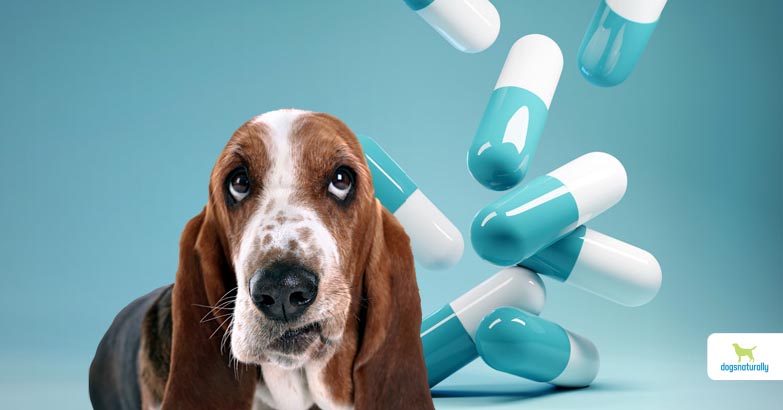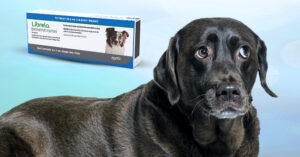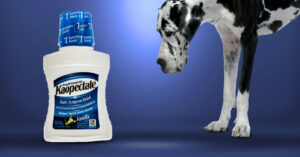It’s a good bet that most visits to the vet’s office will result in you leaving with antibiotics for your dog. But antibiotics could be the wrong option … and it could actually make the problem worse and more harmful to your dog’s long-term health.
Are Antibiotics Overprescribed?
Are we saying antibiotics are being overused in veterinary medicine? If it’s anything like human medicine, antibiotics for dogs are absolutely overprescribed!
According to an article in the Journal of the American Medical Association, as much as 50% of antibiotic use is unnecessary. Jeff Bender, DVM at the University of Minnesota, concurs. He says it’s likely the amount of inappropriate use in companion animals is close to the same estimate in human medicine.
And antibiotic overuse doesn’t just mean wasting money. There are very real problems associated with antibiotic use. Problems that every pet owner should know about.
3 Side Effects Of Antibiotics For Dogs:
Here are 3 reasons to reconsider using antibiotics …
1. Antibiotics Are Creating Superbugs
Dr Alexander Flemming, who discovered the antibiotic penicillin, immediately saw the drawbacks of the drug. In 1945 he cautioned people. He said the misuse of penicillin could lead to mutant forms of bacteria that would resist the drug. He was absolutely right.
An estimated 14% of the staphylococcus strains isolated from human patients in a London hospital had developed resistance to penicillin by 1946. That was just three years after the miracle drug was introduced.
And penicillin was just the stepping stone to other microbe killers. Within three decades, several more drugs were introduced to combat bacteria and infections. This included amoxicillin, tetracycline, and streptomycin. By the 1970s, there were over 100 human antibiotics on pharmacy shelves.
Britain’s most senior medical adviser, Dr Sally Davies, says the threat from infections resistant to antibiotics is serious.
“There are few public health issues of potentially greater importance for society than antibiotic resistance. It means we are at increasing risk of developing infections that cannot be treated.”
How Are Superbugs Created?
Drug resistance arises when drugs knock out susceptible infections. They leave hardier, resilient strains behind. The survivors then multiply and over time become unstoppable superbugs. Methicillin-resistant staphylococcus aureus (MRSA) is one example.
“In the past, most people haven’t worried because we’ve always had new antibiotics to turn to,” said Alan Johnson, consultant clinical scientist at the Health Protection Agency. “What has changed is that the development pipeline is running dry. We don’t have new antibiotics that we can rely on in the immediate future or in the longer term.”
The overuse of antibiotics is creating a worldwide threat of infection with potentially catastrophic results. But antibiotics also have more immediate problems.
2. Antibiotics Kill All Bacteria
At first glance, this might seem like a good thing. After all, that’s what they’re designed to do, right? The problem with antibiotics is that they’re indiscriminate killers. Good bacteria, bad bacteria, any bacteria that aren’t resistant to the antibiotic will be killed.
Let’s look at why that’s a problem by looking at your dog’s microbiome.
The Importance Of The Microbiome
There are little communities of microbes throughout your dog’s body called the microbiome. They’re made up of microorganisms like bacteria, fungi and viruses. They live in your dog’s ears, on his skin, in his mouth, and in his respiratory tract. The vast majority of these bacteria (or microbes) live in your dog’s digestive system. The microbiome is so important to your dog’s health that it’s called the “forgotten organ”.
Your dog’s microbiome plays a key role not just in his nutrition, but in his health and happiness. The majority of the immune system resides in the gut and is reliant on beneficial bacteria. They produce vitamins, help in hormone production and compete with harmful bacteria.
The microbiome supports and protects your dog in these ways:
- Protects against pathogens like parvovirus, distemper, yeast, E coli, salmonella, lepto and Lyme.
- Forms a protective barrier against drugs, toxins, allergens and carcinogens.
- Affects your dog’s mood and reflects stress and can disturb communication between the brain and the gut. This affects critical functions like the immune system.
- Produces B vitamins, which metabolize carbohydrates, proteins and fats.
- Produces short-chain fatty acids. These are used for the absorption of calcium, magnesium, iron and other minerals.
- Is a critical part of the immune system that holds the gut-associated lymphoid tissue (GALT) forming 90% of the immune system.
Antibiotics kill the friendly bacteria in your dog’s microbiome. And that can lead to long-term illness, disease and perceived allergies.
PRO TIP
Probiotics can help restore your dog’s microbiome if you’ve already used antibiotics. But you can’t use just any probiotic. The best options are Saccharomyces boulardii and soil based probiotics like Bacillus subtiliis and Bacillus coagulans.
3. Antibiotics Cause Nutrient Deficiencies
Your dog’s microbiome has another important role and that’s helping with digestion. That’s because beneficial bacteria in the microbiome help your dog produce enzymes for digestion. And that helps him better digest the nutrients in his food. It also leads to the production of B vitamins, including B12. In fact, the gut is the only place where B12 is manufactured.
Once your dog’s food gets digested, nutrients move through the intestinal wall into your dog’s bloodstream. This provides energy support to cells throughout his body.
Antibiotics will deplete vitamins B1, B2, B6, B12 C, E, K inositol and magnesium. This can lead to a list of health problems including:
- Anemia
- Diarrhea
- Behavioral changes
- Poor wound healing
- Allergies
- Weakened immune health
- Oxidative stress
- Nerve degeneration
- Yeast
- Irritable bowel syndrome
- Leaky gut
RELATED: DIY solutions for your dog’s allergies …
If your dog is vitamin deficient it could show up as skin issues, lethargy, sickness and disease. Problems get worse when additional doses of antibiotics are given to treat problems caused by the initial dose.
If you feed your dog a processed diet enriched with synthetic vitamins and minerals, you could have even more issues. That’s because these nutrients aren’t as bioavailable as the real thing. And why it’s critical to protect your dog’s vitamin stores.
PRO TIP
You can give your dog an extra boost of vitamins and minerals with whole foods or food-sourced supplements.
Want To Use Antibiotics? Consider This …
Trying to repair the gut biome after the fact might not be possible.
Martin Blaser of New York University’s Langone Medical Center argues that antibiotics’ impact on gut bacteria is permanent.
“Early evidence from my lab and others hints that, sometimes, our friendly flora never fully recover. These long-term changes to the beneficial bacteria within people’s bodies may even increase our susceptibility to infections and disease. Overuse of antibiotics could be fuelling the dramatic increase in conditions such as obesity, Type 1 diabetes, inflammatory bowel disease, allergies and asthma, which have more than doubled in many populations.”
Researchers are investigating antibiotics to understand their long term impact. This includes the intestinal flora and creating antibiotic resistant superbugs. Maybe it’s a good time to consider natural antibacterial solutions that are kinder to the beneficial bacteria. And to your dog.
Ask Questions Before Antibiotics
Just like you, dogs are subjected to more than a few rounds of antibiotics in their lives. The short term benefit of antibiotics can do real damage to the immune system. It leaves your dog more vulnerable to other diseases, and chronic skin and bowel issues. So the next time your vet wants to prescribe antibiotics for your dog, ask these questions:
- What is the diagnosis?
- Has the antibiotic suggested been successful as the treatment?
- Is there an alternative to antibiotics?
- What will happen if antibiotics are not given?
- What are the side effects and dangers of antibiotic use?
It’s important to understand whether the benefits of antibiotics outweigh the risks. If they don’t, find another option … and another vet. A vet with a holistic mindset may have some great alternatives to antibiotics. You can visit the Academy of Veterinary Homeopaths for a list of homeopathic vets.
Antibiotics often provide short-term benefit for long-term damage. And that means you could end up with a sicker dog and more problems than you started with.
RELATED: 3 ways to clean up antibiotic damage …
Reference
Antibiotic resistance in pets an increasing problem. Center for Infectious Disease Research and Policy. Aug 2016.













